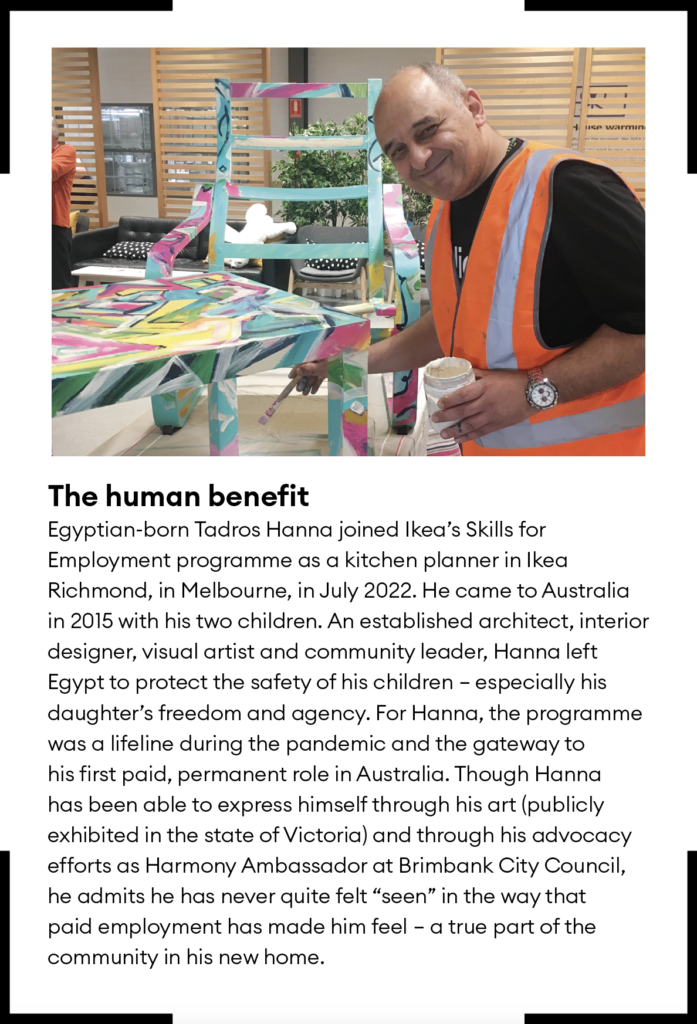Employers can simultaneously help address one of the world’s biggest humanitarian crises and tap into a rich pool of under-used talent.
As yet another humanitarian crisis unfolds before our eyes, organizations must overcome misconceptions and biases around recruiting from rising numbers of global refugees and act on the multiple benefits of hiring from this deep pool of untapped talent.
One in every 95 people on Earth has fled their home searching for safety. The number of refugees worldwide doubled between 2010 and 2020, and unfortunately, 2022 is another year of unprecedented human exodus. Yet, despite spiralling numbers, the recruitment rate of refugees is staggeringly low. This is surprising, considering that the global talent shortage and the need to demonstrate authentic social impact are two of the major challenges keeping leaders awake at night.
Our recent study reveals that reluctance to engage in refugee recruitment stems from misconceptions, biases and heavy overestimation of the challenges associated with the process. Managers assume that hiring refugees is time-consuming, costly, cumbersome and provides limited returns on investment. They fail to realize that refugees are predominantly young and often well-educated, offering a multitude of exceptional skills and experience.
Contrary to misconceptions, we found that employers who have hired refugees experienced multiple benefits and returns on their investment. There is much to learn from those companies. Fortunately, we don’t have to look far to find exemplary cases.
Ikea’s commitment to employing refugees
Ikea’s global commitment is to support the employment efforts of 2,500 refugees around the world by the end of 2023. Their Skills for Employment initiative has been rolled out in 24 countries so far, each taking a unique, context-sensitive approach to implementation. For example, in Australia, Ikea has partnered with diversity and inclusion specialists Community Corporate to help create and deliver a programme designed to help overcome barriers to employment for refugees. Participants spend two months in a paid work placement, and graduate having gained both crucial work experience and a reference for future employment.
The programme has demonstrated numerous benefits to the organization, including increased employee engagement and pride in an inclusive culture, greater cross-cultural competence and new mentorship skills for co-workers. For Ikea’s diverse customers, there are shared languages and deeper cultural connections, leading to a better customer experience. As a business, Ikea has been able to access a new talent pool of adaptable, resilient and driven co-workers.
The ambition for Ikea is to change how society views people from refugee and asylum seeker backgrounds by challenging stereotypes. Harriet Pope, project leader for the Ikea Australia Skills for Employment programme, says: “For Ikea, this values-based investment aims to help change the narrative around refugees through leading by example, sharing positive stories, and inspiring others to take action.”
The company wants refugees to be seen for who they are and the value they bring, not their stereotypes, says Pope. “Our objective for the programme is to provide a bridge between the situation that our refugee participants find themselves in, through circumstances beyond their control, and where they have the potential to be. It is already proving to be mutually enriching for refugees, our teams and our business.”
Having a collaborative partner, Community Corporate, co-design the programme and be intimately involved in all aspects of the implementation has helped make it a success. Though not the focus of the programme, over 80% of participants were offered ongoing work where roles were available. More than three-quarters – 78% – are still employed with Ikea.
While changing the narrative, Ikea is simultaneously enriching its value-driven business model. The principles that drive success for any company in recruiting refugees are very simple: consider refugees as an often-overlooked talent pool; engage local partners specialized in refugee employment; and engage your workforce to allow for mutual learning.
While an unprecedented number of refugees cross borders every day, companies across the world can make a difference by stepping forward to support the employment of refugees. Not only will they be helping to address one of the most pressing social challenges facing the world, they are likely to be very pleasantly surprised by the benefits they gain by employing refugees.
Dr Jeannie Lee is a lecturer in management at the Newcastle Business School, the University of Newcastle, Australia. Dr Betina Szkudlarek is an associate professor at the University of Sydney Business School and teaches on the global CEMS programme.


